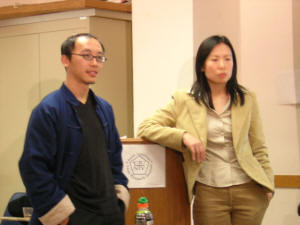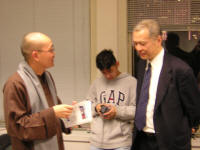
Joanne Chang is an Assistant Professor in the Music Department at Queensborough Community College, The City University of New York. Dr. Chang received her undergraduate degree from Queensland Conservatorium at Griffith University in Australia, her Master's degree from the Manhattan School of Music, and her Doctoral degree from Columbia University. Her teachers include Constance Keene, Karl-Heinz Kammerling, Natasha Vlassenko, Mykola Suk, Valida Rassoulova and Lev Vlassenko, (the later four are direct student descendants of legendary Rachmaninoff).
In 1995, she gave her recital debut in Australia, and subsequently performed in Die Stiftung Schleswig-Holstein Musik Festival in Germany, and in New York's Carnegie Weill Recital Hall. Dr. Chang also premiered Four Temperaments by Hindemith with the Taipei Symphony Orchestra at the National Concert Hall in Taiwan. Her selected performances include a recital and a chamber music tours in Taiwan (the former one being sponsored by the Italian Fazioli Piano Corporation), invitations from Faust and Harrison in its series of "Pianists for the New Millennium", Merkin Hall of Abraham Goodman House sponsored by Artist’s International Inc., Four-Hand piano concert from Klavierhaus Inc., a concert tour in Switzerland; and recitals at Symphony Space, Steinway Hall, NYPL at Donnell branch, an extensive Australian concert tour (including one concert at the Queensland Performing Arts Complex), Carnegie Weill Hall in New York City.
Dr. Chang has also established herself as an interdisciplinary researcher (music and psychology). She has several publications in scientific journals such as Psychology of Music in the United Kingdom and Medical Problems for Performing Artists in the USA. In addition to concert performances and publications, Dr. Chang is a multiple grant award winner: two PSC-CUNY Grants, two G. Shuster Fellowships and two Travel Awards from the State of New York.
Dr. Chang has also served on the faculty of City College, Lehman College, John Jay College (all CUNY), New Jersey City University, and Montclair State University. Her recent events include a piano recital and lecture in Shanghai City, China during the summer of 2009.

Peter Lin received his Ph.D. degree in Clinical Health Psychology from Ferkauf Graduate School of Psychology and Albert Einstein School of Medicine, Yeshiva University. Clinical health psychology is a clinical specialty program. It trains a clinical psychologist who is mindful about the body-mind connection. Dr Lin’s primary psychology training was at Cornell Medical College. His previous training in therapeutic modalities includes experiences in individual and group psychotherapy, both brief and long-term interventions. Throughout his clinical trainings, he has worked with children, young adults, adults, and elderly. Currently Dr. Lin is a postdoctoral fellow at Columbia Medical School’s HIV Research Center. He is also pursuing a Master Degree in Biostatistic at Columbia University. Dr. Lin’s research interests are HIV-related distress and Buddhist psychology. His professional goal is to provide mental health service for the Asian minorities in this country, especially for the Taiwanese community.



